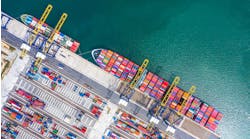Supply Chain Guidelines Could Save Billions for Ocean-going Shippers
AIAG, an organization focused on best practices for automotive manufacturers and service providers, has published Recommended Business Practices for Long-Distance Supply Chains, a set of guidelines to identify waste, errors and miscommunication across intercontinental, ocean-going supply chains.
“Companies expect global shipments will be late, so they build waste and inefficiency into their operations to compensate for a bad process,” says J. Scot Sharland, executive director of AIAG. “AIAG volunteers, who represent stakeholders at all levels of the global supply chain, have proven that it doesn’t have to be that way.” The AIAG has developed a system that will let companies reduce parts inventories and premium freight shipping costs, and reduce the time employees spend tracking shipments.
The guidelines are based on the findings of AIAG’s Material Offshore Sourcing (MOSS) project, which studied ocean-going supply chains, including order, transport and customs processes, to identify the root causes of errors that lead to shipping delays.
Among the findings:
● An estimated 15% of all shipments experience delays due to inaccurate or incomplete data.
● Most errors stem from the manual input of data, which is often re-keyed multiple times by different parties, and through phone and fax communication.
● North America-based automakers and suppliers may be able reduce working capital by as much as $1.7 billion if these delays are eliminated.
The new AIAG guidelines, developed by a team of 11 supplier and solution provider organizations, led by Honda of America Manufacturing and General Motors, are built around a trade collaboration system that uses a cloud-based Internet solution with common message templates. Essentially, every member of a supply chain that adopts the guidelines will have visibility into a shipment at any point in time, and will communicate with one another via a secure Web portal using standardized forms.
A three-month pilot program involving 20 shipments between General Motors and a Korean supplier reportedly was 100% effective in reducing shipping errors. Other participants in the pilot included TradeMerit Corp., which developed the trade collaboration software, the National Institute of Standards and Technology (NIST), Pohang University of Science and Technology, Menlo Worldwide Logistics, Marsh Inc., APL, Atlas BX Co., Ltd., Eagle Global Brokerage, CEVA Logistics and Exel.
Based on the results of the MOSS study and pilot project, AIAG estimates that annual cost savings of 1-4% the global value of imports, or a conservative estimate of $21 billion, could be achieved if there were global adoption of the guidelines.


